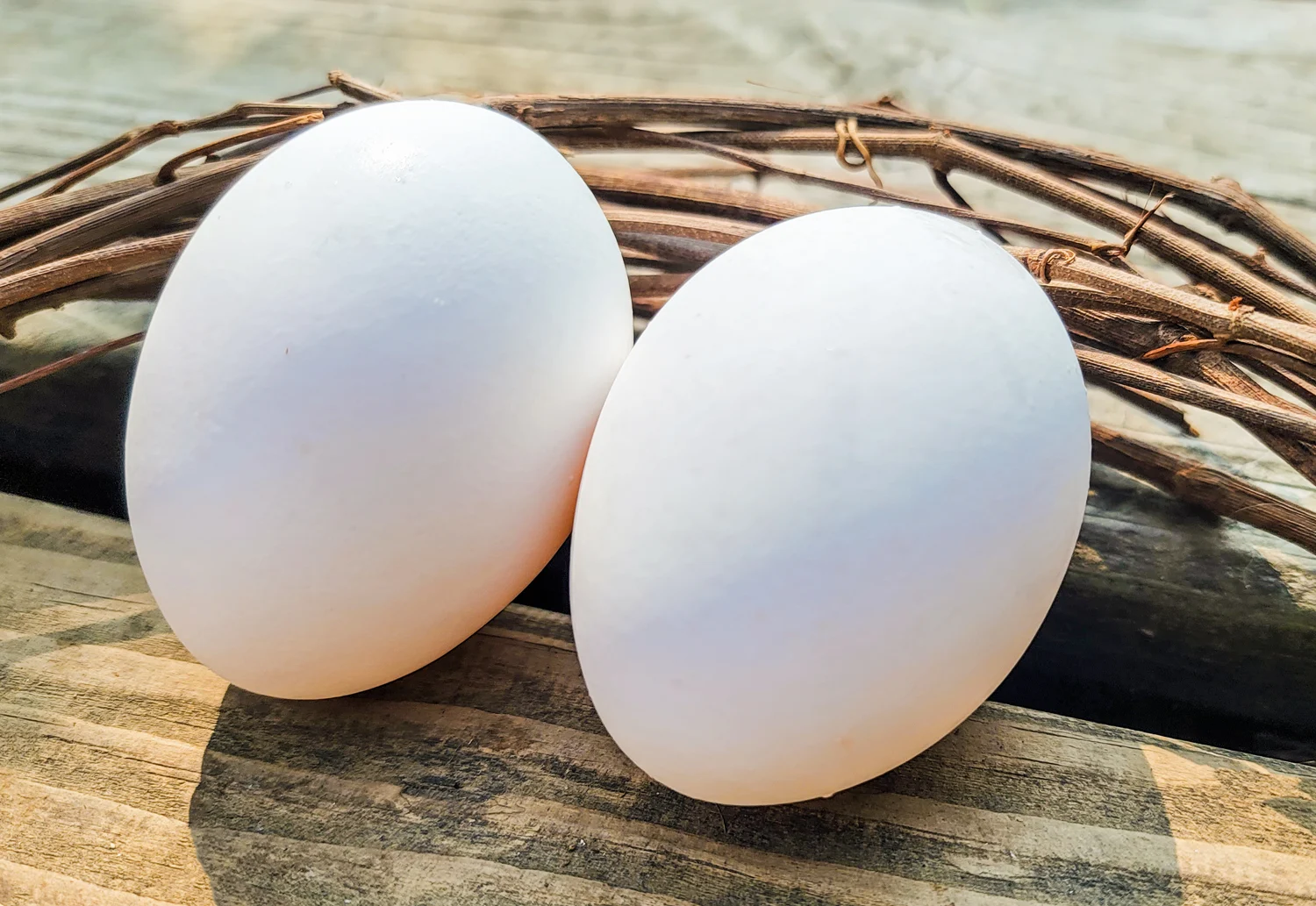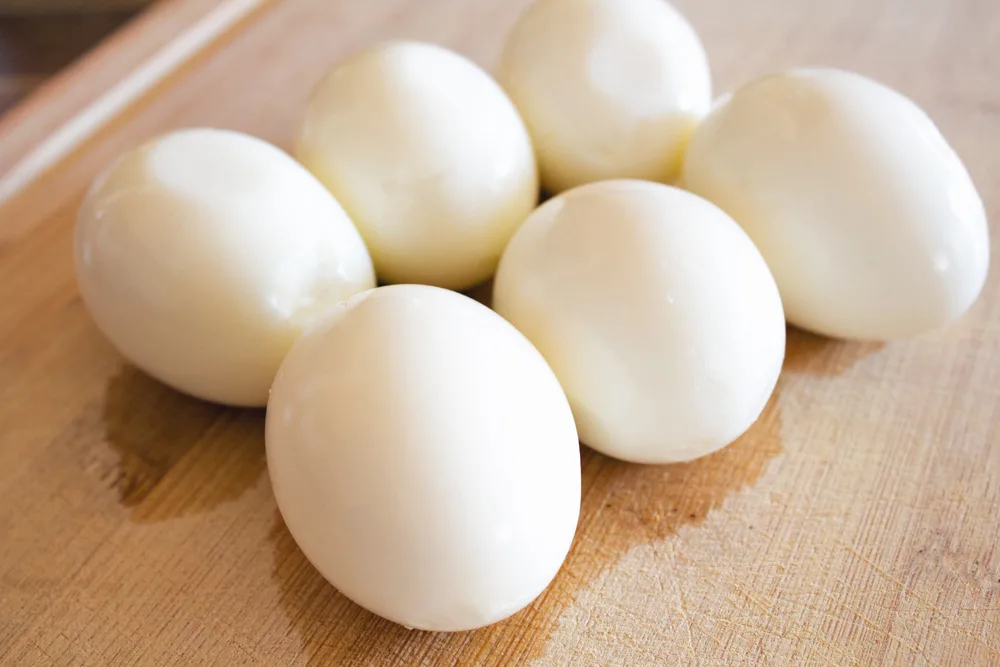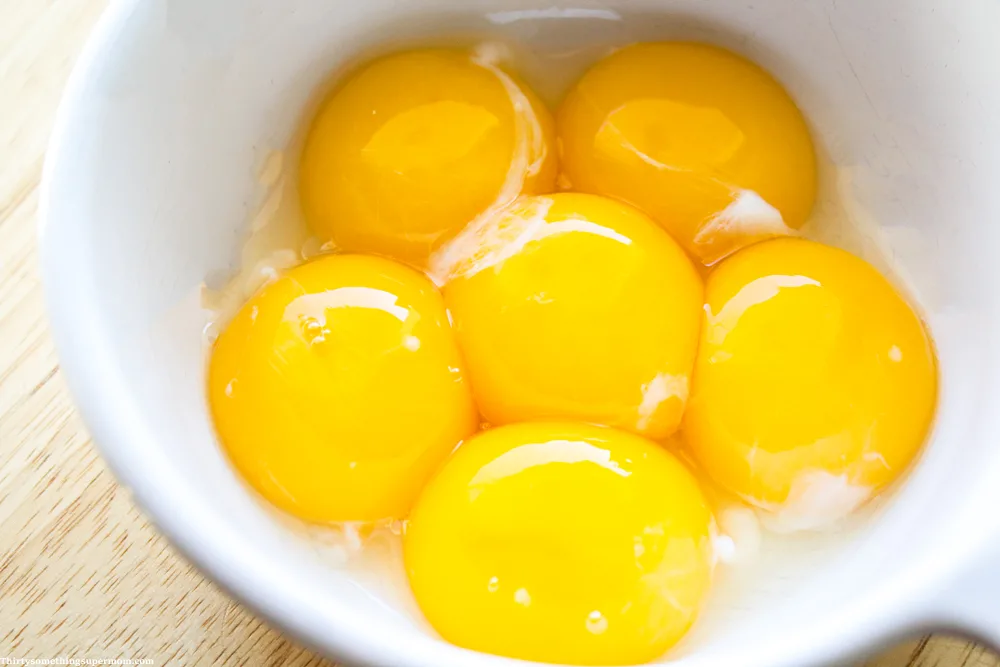This article answering the question of how many eggs a day on a keto diet can you eat contains affiliate links which means that if you make a purchase after clicking a link, I will receive a small portion of the sale at no additional cost to you.
If you’re on a ketogenic diet or any low-carbohydrate diet, you probably already know that eggs are a high fat, high protein food.
This is why many people following a low-carb diet consider this one of their favorite foods. But how many eggs can you consume in a day while maintaining ketosis?
This blog post explores the nutritional value of eggs and the role that they play in a low-carb, high-fat diet such as the Keto diet.
We’ll cover their nutritional benefits, provide creative ways to use them with easy recipes, and address some of the most common questions about egg consumption for a keto lifestyle.

Increasing Your Protein Intake with Eggs
Egg yolks and whole eggs are abundant in beneficial fats and serve as an exceptional protein source, making them a valuable addition to a low-carbohydrate eating plan.
A single large egg contains vital nutrients and approximately 6 grams of protein. Should you prefer egg whites, they can be seamlessly integrated into your culinary repertoire.
Introducing hard-boiled eggs into your daily routine presents a practical and low-carb alternative.
Eggs possess the advantage of being low in calories and carbohydrates, affording you increased flexibility in your meal arrangements.
Moreover, eggs have the potential to overcome weight loss plateaus and have been associated with diverse health advantages.
Nevertheless, it is advisable to seek guidance from a healthcare professional if you have specific medical conditions or concerns regarding cholesterol levels or the risk of heart disease.
You could also read up on what the American Heart Association says about the subject.
How Many Eggs A Day On A Keto Diet Can You Eat?
Beyond their protein content, eggs play a crucial role in your weight loss journey by promoting satiety and aiding in calorie control.
By incorporating eggs into your meals, you can experience prolonged feelings of fullness, potentially leading to a reduction in overall calorie intake throughout the day.
Furthermore, eggs can help overcome weight loss plateaus as they boost metabolism and enhance fat burning.
Remember that there are no hard and fast rules regarding the number of eggs you should consume.
It ultimately depends on your individual dietary goals, preferences, and any specific medical conditions you may have.
In summary, eggs are an excellent source of protein and a variety of essential nutrients. They can be a valuable asset in supporting your keto lifestyle, weight loss efforts, and overall well-being.
With their abundance of health benefits and versatility in various recipes, eggs are a smart choice for those seeking a nutrient-dense, low-carbohydrate option.

Are Eggs a Healthy Fat?
Yes! Eggs are a nutritional powerhouse, offering a rich array of essential nutrients, high-quality protein, healthy fats, and a variety of vitamins and minerals. With approximately 5 grams of fat per egg, this is a great choice, especially on a low-carb ketogenic diet.
Notably, egg yolks contain essential amino acids and healthy fats, including omega-3 fatty acids, which contribute to overall well-being.
So even if you decide to omit the yolk, eggs can give you a boost of healthy fats.
Finding the right egg balance when it comes to the ketogenic diet can be tricky but there’s flexibility in the number of eggs you can incorporate.
There’s no one-size-fits-all approach, but rather a focus on aligning your egg consumption with your desired calorie and macronutrient targets.
As a rough recommendation, consuming 3 to 5 whole eggs daily is a commonly accepted and healthy range for many individuals.
However, it’s crucial to pay attention to your body’s signals and make adjustments as needed.
Many keto dieters claim that increasing their fat intake with eggs has helped limit the symptoms of the dreaded keto flu which is just one reason to include eggs into your low-carb lifestyle.
Tips for Incorporating Eggs into Your Keto Journey
Get creative with your cooking and explore a variety of egg preparations, such as hard-boiled, scrambled, or poached.
Trying different methods will add excitement to your meals and satisfy your taste buds while meeting your nutritional needs.
Mix in Egg Whites: If you’re mindful of your fat intake, combining whole eggs with egg whites is an excellent way to enjoy the benefits of eggs while managing fat content.
Boost Flavor with Healthy Fats: To enhance the nutritional value of your meal, consider using cooking oils like coconut oil, olive oil, or avocado oil when preparing your eggs.
These oils are rich in heart-healthy monounsaturated fatty acids and can help maintain stable blood sugar levels.
Eggs are not only delicious but also incredibly versatile and packed with various health benefits.
Whether you’re aiming for weight loss, looking for low-carb options, or seeking a great source of protein, eggs have got you covered. Plus, they can be prepared in so many different ways, making them a staple food for keto dieters.

Are Eggs Low in Carbs?
One of the best things about eggs is that they are low in carbohydrates. With just about 0.5 grams of carbohydrates per large egg, they fit perfectly into a low-carb diet.
Despite being low in carbs, eggs are a great source of protein which is excellent for supporting muscle mass.
When it comes to your health, eggs have some interesting facts to offer.
They provide essential nutrients like vitamin D, B vitamins, and minerals, making them a great choice for maintaining a healthy diet.
Eggs also contain the good kind of cholesterol also known as good cholesterol, which supports heart health and doesn’t have the same impact on cholesterol levels as dietary cholesterol.
In fact, one of the numerous health benefits of eggs is that they can even help improve insulin resistance, a condition affecting insulin utilization.
If you’re looking for fast and easy recipes, eggs come to the rescue. You can whip up a quick omelet, enjoy hard-boiled eggs as a convenient snack, or incorporate eggs into various dishes like salads, soups, and casseroles to add that keto-friendly touch.

Can An Egg Only Diet Help with a Weight Loss Plateau?
Now, let’s address a few common questions about eggs on a keto diet. Many dieters watching their carbohydrate intake may reach a point where the weight stops coming off.
If you’ve hit a weight loss plateau, it’s essential to review your overall calorie intake and macronutrient balance.
This is usually where the tweaking needs to occur, adding in eggs can help but it isn’t the only way to tip the scales in your favor.
While eggs are a fantastic protein source, you don’t have to solely rely on them. Lean meats, fish, and dairy products can also contribute to your protein needs and add variety to your meals.
Be sure to calculate your daily intake and record how many ounces of cheese, grams of protein you are taking in, etc. to get a clear picture of your consumption.
It’s worth noting that while short-term egg-only diet or egg fasts are common, they are not recommended for long-term use.
Doing an egg fast for a long time can rob the body of other essential nutrients and essential vitamins that can not be found in a single egg.
The key to healthy diet plans is balanced intake from various sources to prevent nutritional deficiencies and support overall well-being.
Cholesterol & Eggs
Cholesterol is a topic often discussed in relation to our dietary choices, especially when following a low-carb or restrictive diet like keto.
It’s important to understand the impact of cholesterol on our health, particularly in terms of cardiovascular disease.
It is important to keep in mind that not all sources of cholesterol are the same. If someone is eating a healthy diet rich in eggs and meats, it is not the same as someone eating a lot of fried foods, the same can be said for sodium.
Just keep in mind that while high cholesterol levels can be a concern for some individuals, it’s important to recognize that dietary cholesterol alone may not be the main contributor.
Factors such as overall diet, lifestyle, and genetics also play a significant role.
In the context of a low-carb or keto diet, where fewer calories are often consumed, eggs are a popular choice. This is because eggs contain essential nutrients and offer a good source of protein.
However, it’s worth noting that the yolk of the egg contains cholesterol and that one large egg typically contains around 186 mg of cholesterol.
The good news is that research suggests the relationship between dietary cholesterol and blood cholesterol levels is more complex than previously believed.
While eating eggs may have some impact on cholesterol levels, it is not the sole determinant of high cholesterol. Other factors, such as saturated and trans fats, have been shown to have a more significant influence on blood cholesterol levels.
Moreover, the long-standing belief that consuming dietary cholesterol directly leads to cardiovascular disease has been questioned in recent years.
The U.S. Department of Agriculture’s nutrition facts acknowledges that the relationship between dietary cholesterol and heart health is not as straightforward as once thought and healthy adults shouldn’t worry so much about their egg consumption.
It’s important to keep in mind that the human body produces cholesterol naturally, and it plays essential roles in various bodily functions.
Our bodies have intricate mechanisms to regulate cholesterol levels and maintain a healthy balance.
Therefore, for many healthy individuals, consuming cholesterol from foods like eggs in moderation may not pose a significant risk to overall health.
However, if you have a specific medical condition or concerns about cholesterol levels, it’s advisable to consult with a healthcare professional.

What are the Nutritional Benefits of Eggs?
Eggs provide essential nutrients like vitamin B, protein, and healthy fats, supporting your overall well-being.
When it comes to nutrition, eggs have impressive facts to offer. According to the U.S. Department of Agriculture, eggs are a great source of protein and essential nutrients.
Including eggs in your diet on a regular basis can be a great way to nourish your body with healthy food.
While some may view a low-carbohydrate or keto diet as restrictive, incorporating eggs can make it an enjoyable and sustainable choice.
From omelets to egg-only diets or even adding cream cheese for extra flavor, eggs offer versatility and flexibility in your meal plans.
In summary, eggs are an excellent choice for those seeking a low-carbohydrate or keto-friendly diet.
They are packed with essential nutrients, provide a good source of protein, and can be enjoyed in a variety of ways.
So, go ahead and make eggs a main thing in your healthy eating journey for the long run, knowing that you’re nourishing your body and supporting overall well-being.
The Best Way to Incorporate Eggs
Incorporating eggs into your diet can be an excellent choice, especially if you’re following a low-carb or ketogenic approach.
From enjoying a delicious omelet to including eggs in fast recipes or even trying a day egg or keto egg fast, eggs provide flexibility.
With only about half a gram of carbohydrates per egg and a minimal calorie count, eggs fit perfectly into a low-carb lifestyle.
They can even help you achieve and maintain a state of ketosis, where your body burns fat for energy.
Whether you’re considering an egg diet, a fast diet, or simply looking for fast and easy recipes, eggs offer a versatile and convenient solution.
They can be enjoyed in various ways, from quick and delicious keto recipes to being the star of a single-egg day.

Easy Low-Carb Recipes that Incorporate Eggs
If you’re inspired by the incredible benefits of eggs and eager to try delicious low-carb and keto-friendly recipes, I highly recommend checking out these mouthwatering creations.
The first recipe, Low Carb Deviled Eggs, will tantalize your taste buds with its creamy and flavorful filling, making it a perfect appetizer or snack option.
For a satisfying and refreshing meal, this Keto Egg Salad recipe offers a delightful combination of eggs, mayo, and crunchy vegetables.
If you’re craving a hearty breakfast or brunch dish, the Bacon, Egg, and Pepper Quick Skillet will undoubtedly hit the spot.
And don’t miss the opportunity to enhance your recipes with the Best Keto Mayo that adds a creamy and tangy twist.
For a cheesy and savory omelet experience, try the Cheesy Peppers and Onion Omelet recipe that is sure to delight you.
If you have a sweet tooth, the Low Carb Banana Bread will amaze you with its moist texture and delightful flavors.
Looking for a gluten-free option? These Gluten-Free SCD Pancakes are a delightful choice for a satisfying and fluffy breakfast. And for those seeking a bread alternative, the Simple Flourless Sandwich Bread is a game-changer.
Lastly, indulge in the Almond Flour Waffle Recipe to enjoy a delectable and guilt-free breakfast treat.
These recipes will surely elevate your egg experience and leave you craving more culinary adventures.
So be sure to sign up for the free newsletter so you never miss another keto recipe again!
About Thirty Something Super Mom

My journey started after a Crohn's disease diagnosis, inspiring a commitment to well-being. This site shares my distinctive approach to healthy living with my collection of nutritious recipes that boast authentic flavors, mimicking the indulgence of traditional dishes. I love sharing guilt free recipes for low carb, keto, gluten-free, paleo, and the specific carbohydrate diet. I also share tips on natural living, including homemade cleaners and cleaning hacks. I also share my experience as a veterinary technician and pet groomer, to integrate pet health tips, homemade dog food recipes, and grooming insights to ensure your pets thrive.
